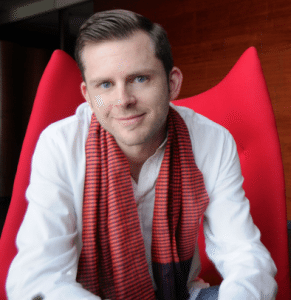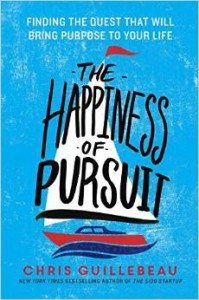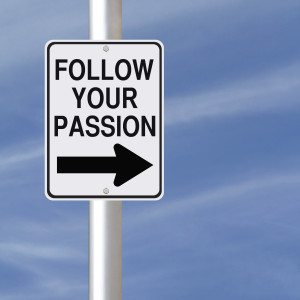If you would have asked me as a little girl if I would classify myself as a rebel, I would have laughed at you.
I was the girl who always followed the rules or the path that I everyone was taking.
But when I got older, things changed. As I began to read about people who went against the grain to try to change the world or people who tried to go against the status-quo, I realized that I indeed had developed this *positive* rebel mentality. I was tired of thinking about what people thought of me. I was also tired of trying to do what “society” said was the right or appropriate route for my life. I kept thinking who are these people telling me how to live my life, anyway?

New York Times best-selling author and modern-day explorer Chris Guillebeau is one entrepreneur and author who is inspiring young people around the world to let go of their fears so that they can start living the life that they have always imagined. (Photo: Stephanie D. Zito)
Then, right when I needed a little boost to really go after my passions, I learned about a book that would literally change my entire perspective about life. That book is called, The Art of Non-Conformity: Set Your Own Rules, Live the Life You Want, and Change the World by New York Times best-selling author and entrepreneur Chris Guillebeau.
He has become one of my favorite authors. I also love his book, The $100 Startup. To me, Guillebeau is one the most motivating people who all youth and young adults can learn from and aspire to be like. I love how he emphasizes that we all should stop caring what people think of us so that we can begin to truly live the life that we have always dreamed of living. He also emphasizes that if we want to achieve greatness, then we must stop asking others for permission to do so.
I was so inspired by his ideas and his own life story that I wanted to feature him on RIZZARR. I am very excited to share my interview with him about his inspiring journey and his soon-to-be-released book, The Happiness of Pursuit: Finding the Quest That Will Bring Purpose to Your Life.
MY INTERVIEW WITH CHRIS GUILLEBEAU
1. What inspired you to write your latest book?
I was drawing near to the end of my journey to visit every country in the world, a quest that took more than ten years. Lots of people asked me to write a book about the project, but I didn’t want to just write about it from my perspective. Throughout the journey, I kept meeting and hearing about others who had also undertaken quests, and I thought that would be a more interesting story—why do people pursue a quest or adventure for a long period of time? What lessons can we learn from them?

Guillebeau’s soon-to-be-released book is The Happiness of Pursuit: Finding the Quest That Will Bring Purpose to Your
And, perhaps, why do we need a quest of our own? What can it do for us? That was the general thought process. I wanted to take these lessons and craft a narrative around them to help people as they think through what to do with their lives.
2. Early in your life, what ideas helped you to begin to not conform to others’ standards?
Well, I was a terrible student and then (later) a terrible employee. I was always very independent and wanted to do things my own way. I should also give credit to my dad, who was very supportive of me and encouraged me to ask good questions. He never pushed me to follow a prescribed path and was even supportive when I wanted to leave high school and (eventually) jump straight into college.
3. Were you at all surprised by the reaction that people had towards your first book,The Art of
Non-Conformity?
Good question. I think some people understood it and others didn’t—which is how it’s always been with my work. If you’re doing something worthwhile, I tend to believe it should be at least somewhat polarizing. People should be able to identify with it or reject it fairly quickly. So in that regard, I wasn’t surprised.
4. Why do you think it’s so important for young people to not be afraid in going against the status quo and to go after their passions?
Because young people have a wide open field of possibilities. It’s still possible to change when we’re older, but when you’re in your most formative years, it’s a lot harder to make a lot of mistakes that are truly lasting. If you follow a passion and it doesn’t succeed, well, you can do something else. What’s scary to me is the alternative: believing in something and having a vision to attempt something big and significant, but failing to do so because it feels too risky or unsafe. Try to avoid this at all costs!
WATCH: FEAR AND PERMISSION: CHRIS GUILLEBEAU AT TEDXCMU 2010
5. What are some of the challenges that you faced as you tried to go after your dreams and your passions? And how did you overcome them?
Where to start? I felt alone. I felt insecure. I was afraid of failure and wondered if I shouldn’t be doing something more different. But again, considering the alternative—there really was no other choice. I still have a lot of struggles, in particular with anxiety and sadness from time to time, but the way I’ve overcome most obstacles is to focus on the outcome. What do I truly want, really? In the end I know I want to make things and help people in some fashion. So that’s what I attempt to do, in various ways.

Guillebeau: “If you follow a passion and it doesn’t succeed, well, you can do something else. What’s scary to me is the alternative: believing in something and having a vision to attempt something big and significant, but failing to do so because it feels too risky or unsafe. (Photo: iStockphoto/ Getty Images)
6. What is your favorite goal that you have accomplished in your lifetime? And why?
Goal #1: Visiting every country (193/193)
Goal #2: Building a community of amazing people along the way. Ultimately, this goal is more enduring and more worthwhile than merely “going everywhere.”
7. What are you hoping that people will take away from your life?
I hope that they will feel a sense of empowerment, a belief that they can pursue a dream of their own and also make the world a better place—and I hope that something I do will help them see how to do that. Inspiration combined with action is a lot better than mere inspiration.
8. What advice would you give to anyone who trying to change/ improve the world?
Don’t stop believing! We need you.








